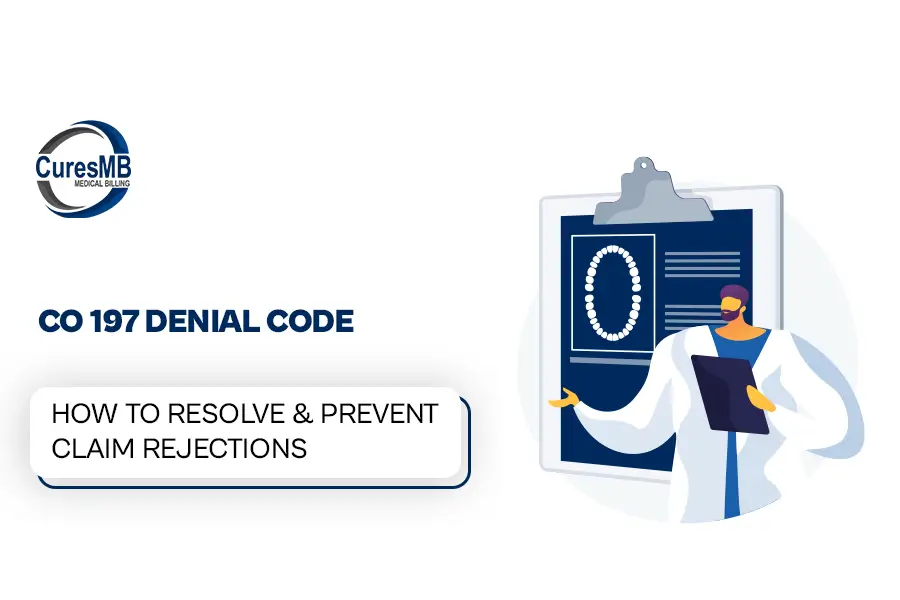
If you’ve received a CO 197 denial code on your Explanation of Benefits (EOB) or Electronic Remittance Advice (ERA), it means your claim was denied because the required precertification, prior authorization, or notification was not obtained.
This is one of the greatest common claim denials in medical billing. Understanding what it means, why it happens, and how to fix it can help your practice recover revenue faster and prevent future rejections
In insurance denial coding, “CO” stands for Contractual Obligation, meaning the provider cannot bill the patient for the denied amount due to payer contract terms.
“197” means Precertification/authorization/notification absent, in other words, the payer didn’t have the required approval for the service.
“Precertification/authorization/notification absent.”
This denial typically appears when:
The service performed wasn’t covered under the given authorization
Step 1: Review the denial details on the EOB/ERA.
Step 2: Check if the patient’s plan required prior authorization for the billed service.
Step 3: Interact with the payer to understand if backdated authorization is possible.
Step 4: Submit any missing documentation or correction requests.
Step 5: If the payer allows, file an appeal with proof of medical necessity and provider notes.
Pro Tip: Document every call with the payer, including date, time, and representative’s name, in case you need to escalate.
Fill out the form below and we’ll contact you shortly.
Code | Description | Common Causes |
|
CO 197 | Precertification/authorization absent | No auth, expired auth, wrong number, non-covered service |
|
While CO 197 and PR 197 both involve missing authorizations, the difference lies in who is responsible:
CO 197 denials cost time and money. By building a proactive prior authorization process, you can reduce these denials dramatically. Use checklists, maintain a payer-specific rulebook, and ensure your team understands the financial impact of missed authorizations.
Need Help? Book a free 15-minute denial audit.
The claim was denied because the necessary prior authorization or notification was not secured before the service was provided.
Missing, expired, or incorrect prior authorization; or non-covered services.
PR 197 is unrelated to CO 197.
Verify requirements, request retro-authorization, correct claim details, and appeal if possible.
Yes, by verifying authorization before services, tracking expiry dates, and ensuring accurate claim data.
Not all the time, some payers allow retroactive authorization or appeals.
Yes, but resolution steps and timelines vary by payer.
CO 96 = non-enclosed service; CO 197 = data errors. Fix CO 197 first to avoid CO 96 cascades.
Discover Cures Medical Billing Services Across Different States
FL
NY
ML
CO
NJ
AZ
TX
CA
WA
We are a team of national medical billing service experts based in Astoria, NY, committed to providing ongoing value to our customers. We leverage technology and implement best practices to provide high-quality and cost-efficient medical billing solutions from domestic locations, enabling customers to achieve their business goals. Cures Medical Billing is the best option for any medical billing needs.
Medical billing around Astoria, NY, and beyond is our core competency and our specialists will efficiently manage all your billing needs. Our medical billing specialists have over 12 Plus years of experience with all security technologies to ensure data integrity for our customers. Using our medical billing service, anyone can make their medical billing task less resource-consuming.
Efficiency & precision in healthcare financial management with Cures Medical Billing, your trusted partner for smarter, faster, and more accurate billing solutions.
This site uses cookies. Read our Privacy Policy